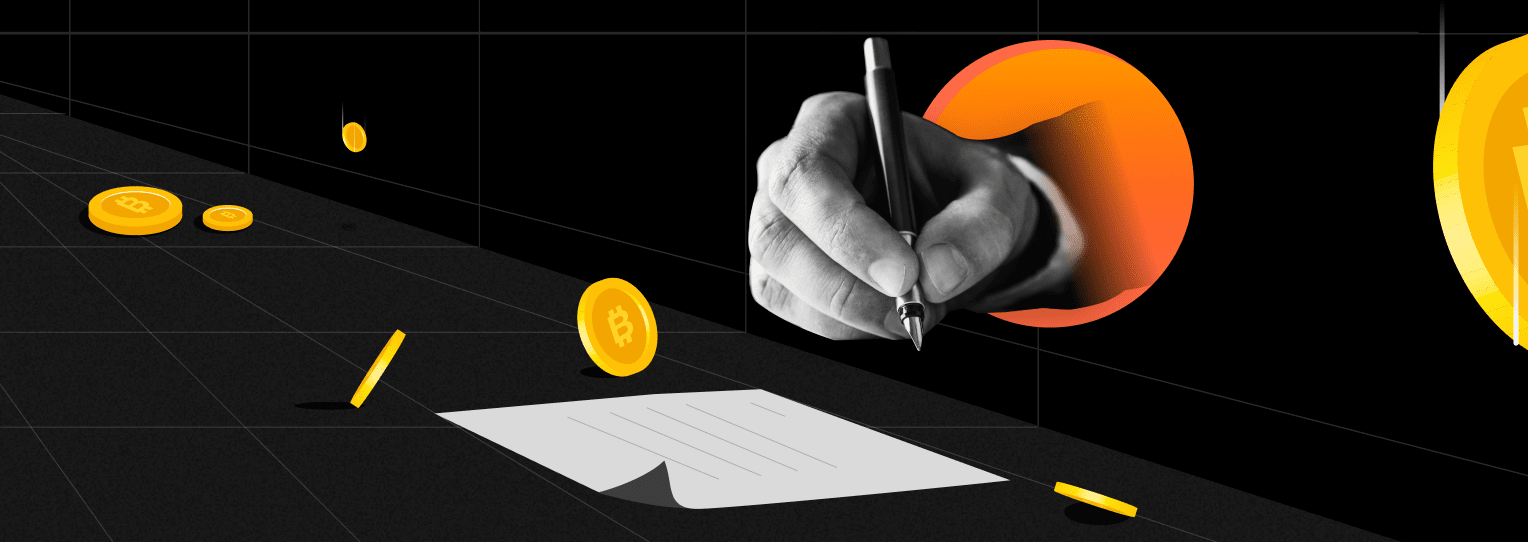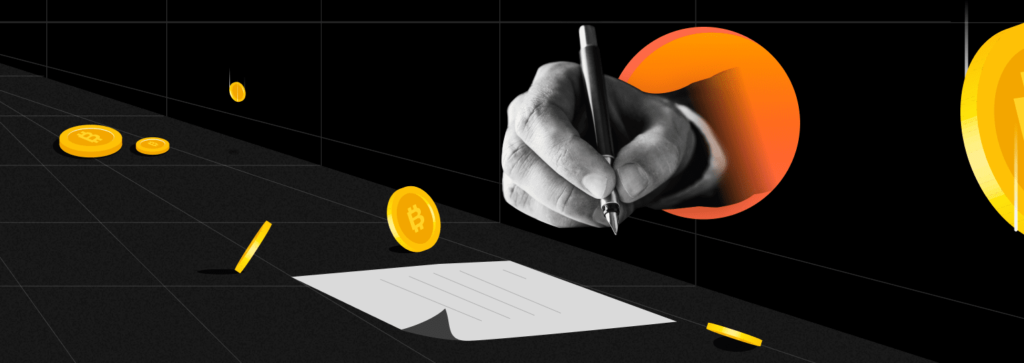
Nick Szabo, a comparatively lesser-known figure in the crypto world, invented the concept of a Smart Contract in 1994. He defined it as “a computerized transaction protocol that executes the terms of a contract.” Smart contracts have been made a technical reality with the onset of cryptocurrencies such as Ethereum and Bitcoin. Since then, we have seen many decentralized services relying on smart contracts to have a framework of rules and protocols to carry out transactions. One example is NFT smart contracts.
In this blog, we will explore deeper into NFT smart contracts and how to create one.
- What is an NFT Smart Contract?
- Standards of Smart Contracts for creating NFT
- Prominent Features of NFT Smart Contracts
- How to create an NFT smart contract?
- Examples of NFT Smart Contracts
What are NFT smart contracts?
An NFT smart contract is a process or a set of agreements for implementing a sale between the owner of the NFT and the buyer. The NFT creators can specify the rules they want to implement in the contract. Smart contracts are self-executing and can execute contract terms without the need for an intermediary or central authority. Smart contracts are managed by a group of computers that carry out the operations when a stated requirement is met or validated.
It ensures that the data stored in the blockchain is accessible and unchangeable. Smart contracts are used in the operation of NFTs to verify ownership and to store data transparently. They can be linked to different digital assets and take charge of royalties. With smart contracts, tokens can be bought and sold with proof of ownership.
Let’s say, for instance, that smart contracts are used in real estate transactions. Both parties (buyer or seller) can create a smart contract agreement to automate the transaction once the buyer pays the seller the property value.
Standards of NFT smart contracts
Now that you know what an NFT smart contract is, let’s look at the two different NFT Smart Contract standards. They are both Ethereum standards that are widely used for secure transactions.

ERC 721 Standard
The ERC 721 Standard is the international standard that describes how to create an NFT on the Ethereum network. It makes NFTs non-fungible, harder to recreate, and a unique asset on the Ethereum blockchain.
The best example would be NFT tickets. All tickets seem identical, but each ticket has a particular ID, a unique barcode, and a serial number, making them exclusive and non-fungible. One ERC 721 can maintain multiple NFT tokens with Token ID and Smart Contract address. It acts for the authenticity of your ownership and keeps the NFT safe from counterfeiting. Due to its ability to distinguish and protect your NFT from fraudulent practices, ERC 721 token standard is one of the most prominent smart contract standards.
ERC 1155 Standard
The ERC 1155 standard is a multi-token, capable of multiple transactions. It helps to add solidity to the NFT smart contract and batch transfer of the tokens. As this standard can manage various tokens, a token ID can display its type, supply, and metadata.
It can assist contracts in being non-fungible, semi-fungible, or fungible tokens. Using a single ERC 1155 Standard, you can transfer multiple token types in a single transaction. It saves on transaction costs and eliminates the need to approve any token contracts as ERC 1155 individually. The goal of this standard is to broaden the token ecosystem and make NFTs more accessible and secure.
Prominent features of smart contracts
Smart contracts enable thousands of legitimate and secure transactions of NFTs. NFT creators come up with different versions and customizations of smart contracts that are suitable for different types of NFTs. Commonly, smart contracts of NFTs have a set of features that make them trustworthy and efficient.
Some of them are listed below.
1. Autonomy and cost savings
NFT smart contracts facilitate a trustless system. This means that parties can transact without knowing each other. Smart contracts do not need any intermediaries to confirm the agreement. This eliminates the risk of third-party manipulation, saving extra costs and time. Moreover, if the smart contract is deployed on a public blockchain, it can be viewed by anyone, owing to transparency.
2. Backup with NFT smart contracts
Smart contract record and save all the information related to a transaction in the blockchain. This data is immutable and cannot be deleted by anyone. Thus, we will always have records of all transactions. We will also never lose the data regarding the original creation of a particular NFT. Thus smart contracts can help us trace and view the history of an NFT throughout its life cycle.
3. Security in NFT smart contracts
Once a smart contract is deployed, it cannot be changed. Smart contract security makes them immutable, encrypted, and extremely difficult to tamper with. In addition, hackers would have to change the entire chain to change a single record in the smart contract. They are also immune to counterfeiting and plagiarism. A smart contract can check an NFTs time of creation and its initial wallet address. This way, it is easier to spot duplicate NFTs and fraudulent transactions.
4. Accuracy and speed
The smart contract will be immediately executed when a predefined condition is met. As smart contracts are digital and automated, there will not be any paper trail to process and no time wastage reconciling the errors that usually occur when done manually.
How to create an NFT smart contract?
The process of creating an NFT is referred to as minting. Here, you are essentially writing the smart contract code. The smart contract code determines the NFT’s characteristics and adds them to the relevant blockchain on which the specific NFT is coded. Below are the steps you can adopt to create an NFT smart contract:
Step 1: To get started, you use the hardhat (a development environment), which will give us a baseline for deploying the contract, performing tests, and so on.
Step 2: You can run the commands using yarn to install hardhat as a development dependency.
Step 3: You can start creating a contract directory in the root folder. Then you can build your first contract file inside this root folder.
Step 4: Create your smart contract specifying the pragma version. To facilitate ERC standards, use a library like OpenZeplin contracts module (a library for secure smart contract development).
You can also get help from blockchain experts like Coinfactory, who can create exclusive solutions ensuring a tailor-made smart-contract architecture and development.
Examples of Smart Contracts in NFT
Smart contracts can be implemented for any kind of NFT. To give an idea of how smart contracts play varied roles, some NFT types are listed below.
Gaming
In gaming-related NFTs, smart contracts can be used in regulating virtual tournaments. For instance, gaming NFTs can hold players’ in-game items, such as skins, assets, and tools. Players could set several rules using a set of smart contracts, like how the assets of the participants should be distributed to the winner of each round.
Streaming
Movie and TV NFTs are becoming a hit nowadays. An NFT can hold multiple movies or episodes of a television show. Users can watch the series through a smart contract, which accepts a micropayment but then plays the movie or series on the user’s device for a predetermined number of clicks. There are increasingly categories of digital entertainment NFTs available for people to hold and trade.
Art Exhibitions
Art NFTs are one of the most prominent forms of NFTs. An artist can embed their work in an NFT and use it to create a smart contract defining the terms of its use. Of Course, there are art galleries on the internet to display art NFTs. So, for example, smart contracts can enable fine art galleries to purchase art and display it on a real screen in their space. They can also divide the money from ticket sales with the artist according to the agreed terms.
Closing thoughts
Smart contracts are changing our view of digital assets, ownership, and royalties. It provides significant benefits in improving process efficiency and ensuring information security. Smart Contracts in NFTs diminish transaction complications and allow the data to remain public for quick authentication. A smart contract can keep NFTs tamper-resistant and safeguard against unauthorized access and intrusions. As smart contracts get refined, NFTs in the future can hold the baton to empower even more artists, creators, and businesses and allow customers to have ownership over digital assets, which can prove the owner’s genuineness.


